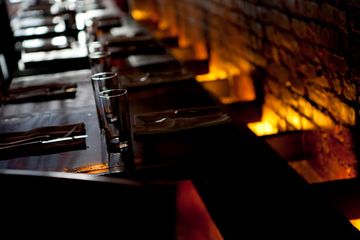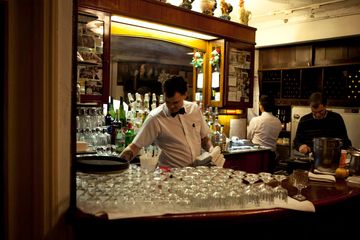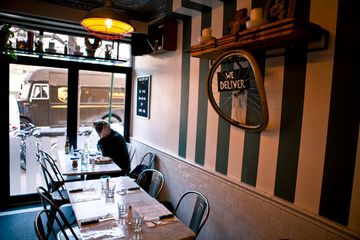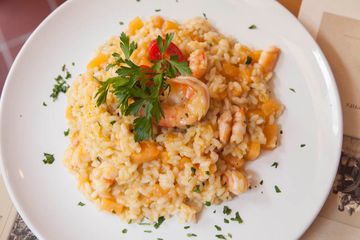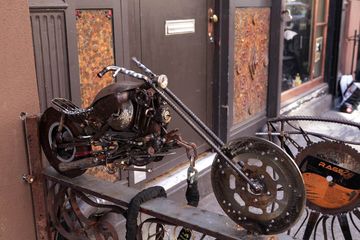Biking with my husband on a beautiful August day, I stopped short when I noticed something new and picturesque on 5th Street. It was three o’clock in the afternoon, but I had been holding out until I discovered the perfect place to grab a bite to eat, and I certainly landed in an ideal spot. The rustic charm indoors, with replicas of the farm equipment used in Italy hanging from the ceiling, captured our hearts immediately, but it was the food – the outstanding rice dishes – that solidified Risotteria Melotti indefinitely on my list of top restaurants to recommend. Since the restaurant was quiet at this odd hour, we were able to chat casually with the staff throughout our meal, and we learned not only about the history of the restaurant, but also about the world of rice. Back in 1986, a couple began producing rice on one acre of land in Verona, Italy. Almost three decades later, together with their three sons, Rosetta and Giuseppe now farm 544 acres of land, all devoted to growing award-winning rice that is sold the world over. There are basically two different textures of the grain that they produce. Vialone, the more traditional rice, is rich in proteins and vitamins and, because it absorbs liquid better, is used for their delicious risottos. Carnaroli rice, “considered one of the best in the world, ” is more readily used in salads because it remains al dente when cooked, adding a chewiness to the superb insalata di riso that we shared. We both marveled at the combination of chopped tomatoes, cucumbers, roasted red and yellow peppers, capers, fresh mozzarella and, of course, brown rice. When we first sat down, a bread basket was placed on the table. Their take on focaccia was very good, but I could not stop sampling their rice cakes throughout our meal – the basic recipe is made in Italy and then flown here to be tossed with olive oil, salt, pepper and fresh rosemary and then baked for fourteen minutes. I cannot say enough about how amazing the second dish that we tried tasted. We never knew that you could make polenta from anything but cornmeal, but we had our eyes opened to something new and wondrous when we had our first taste of polenta fritta con caciottina – a fried rice polenta with mushrooms and cheese that was perfectly moist in the middle with an added crunch on the outside. Every mouthful was rich and heavenly. This brand new restaurant – the first outside of Italy – serves about thirty people, making for an intimate setting, especially when evening falls, the lights are dimmed and the candles are lit. Up front there is a little “shop” that sells many of their rice products. The staff explained that the family has made an across-the-board decision to only offer Melotti’s gluten-free rice merchandise in the States. Thus, anyone eating gluten-free can come to their restaurant and be served a carefree, excellent meal. Anyone fortunate enough to live in the area can either have their food delivered to them in their home or office, or stop by, browse the menu, and take it to go. I have no doubt that we would be eating a lot more rice if we lived in the East Village, but we will visit as often as we can.
